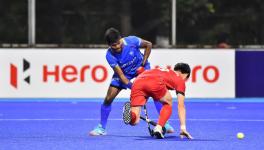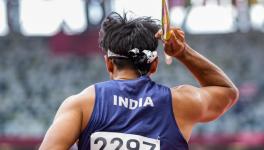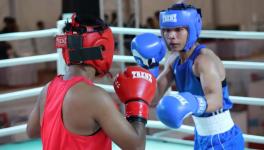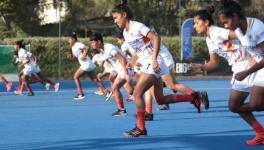Lockdown Tales from Hockey: Neha Goyal Dribbles Around Life’s Questions
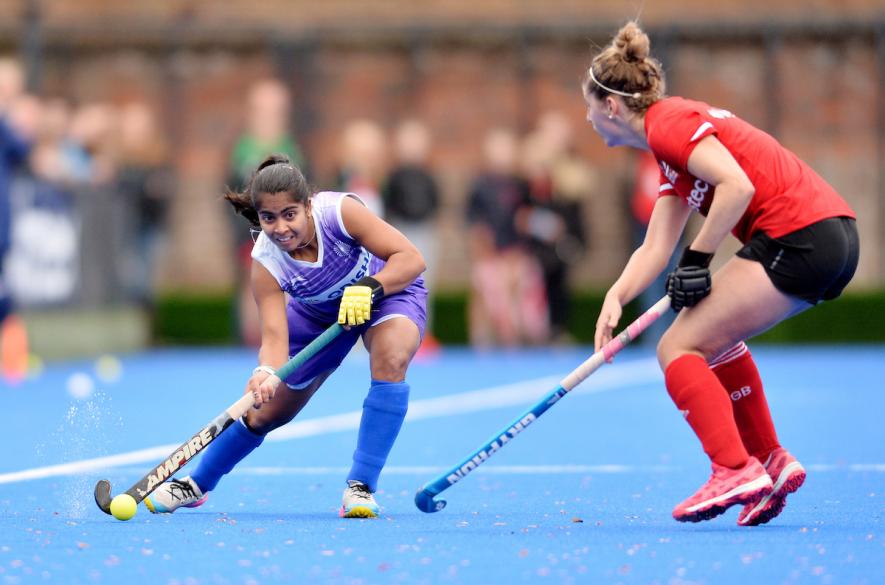
Neha Goyal has played over 50 times for the Indian women’s hockey team in the last six years — assisting, scoring and cheering at crucial moments, completely fit and her place secure.
Neha Goyal’s dream was finally real, or she hoped it would be. Thirteen years after first picking up a hockey stick, six since her national team debut, two since a lung busting performance established her in Indian hockey’s mainstream, four months after the historic night that altered women’s hockey in the country forever, she wondered if this was the moment and knew that if it was she needed to grab it and not let go.
She has played over 50 times for the Indian women’s hockey team in the last six years — at the World Cup, at the Champions Challenge, at the Olympic qualifiers, the play offs — assisting, scoring and cheering at crucial moments, completely fit and her place secure. A young promising career was rolling forward, seemingly towards the ultimate stage, the Olympics.
And then it all stopped.
A virus called a halt to everything. Even the Olympics, the greatest sporting constant of all. From perpetual motion to an unending state of suspension. Stuck now at the Sports Authority of India (SAI) centre in Bengaluru — the Indian hockey teams’ training base — Goyal ruefully admits to feeling a little disappointed. “My heart broke when I read the news. I’ve been away from home for so long, we have been training for this for so long. It was the ultimate dream. But then I pulled myself together. Staying safe is more important. Yahan log mar rahe hain, toh Olympics kya hai (people are dying around so Olympics doesn’t matter)...”
Also Read | The Chains Of Sport: Passion, Emotion and a Ruthless Disregard for the Worker
“The first thought was: Wow we are lucky. We get three meals a day, a roof over our heads, superb facilities, good company. There are families, individuals, people struggling. Ek din ka khana naseeb nahi ho raha (many are not getting a chance to eat a proper meal.”
Goyal has seen that first hand. When she walked on to a hockey pitch all those years ago, she did so at the behest of a friend. She didn’t have a stick, shoes or a behind-the-scenes sports machinery pushing her to success. Her father (who passed away in 2018) was a daily wage labourer whose earnings went into supporting a family of five. Her mother, a housewife, did odd jobs to supplement the family’s income.
She wanted to play the sport to reduce the burden on her family. Hockey was a sport, sure, but hockey was also work. It offered her a chance to climb out of a strata of society she was born into, and promised herself that through hard work and dedication she would catapult into another. She told Pritam Rani Siwach exactly that, and was promptly offered a place in the academy. She also told Siwach she wanted to play for India.
Siwach, who was part of that Indian women’s hockey team which created history in Manchester in 2002, believed her. The story of Siwach and teammates became folklore and then cinema, to a point where the film is now better known than the game itself. Indian hockey begins and ends in blue kits. Siwach knew, more than most, the need to do better at the grassroots.
Siwach’s career wound down soon after and the academy she started became the focal point of her life. She wanted to create opportunities for girls to play hockey. Not only an escape, but well enough to get into the Indian team. Goyal was under Siwach’s discerning eyes now.
Those early days are a jumble of sentences and memories in Goyal’s head. There was hard work, good results, then an injury that refused to go away. “I remember clearly registering that there was an injury around 2012,” she says, “Sometime during the Junior Women’s Asia Cup. It was the sole of my foot. Something was wrong and physically I just wasn’t there.” After that tournament — India finished runners up, their best finish ever — Goyal was off for six months recuperating, rehabbing and taking time off the game.
What followed was a game of roulette. Post recovery she made it back to the junior national team, and not too long after was kitting up for the seniors at the FIH Champions Challenge in Glasgow. Indian women’s hockey was looking up, there was renewed attention, players of immense quality pushing a late surge to get to the Rio Olympics. Goyal, 17 on debut, was on a surge of her own.
The wheel stopped short. India qualified for the Olympics, the women’s first appearance at the Games in 36 years. Goyal didn’t make it there. That old injury resurfaced at the 2015 Nationals in Kerala. Again she went through recovery and rehab. Again she dropped back to the Junior team.
Also Read | Premier League Clubs United On Way Forward For Season, Players Fear Comeback
“Those were rough times. To be honest I wasn’t so sure of being picked for the Olympics, but I was looking forward to the Junior World Cup. We didn’t manage to qualify though,” she says. The injury and subsequent rehab took a toll on her finances and peace of mind. “It was crazy expensive to get physiotherapy. They would charge Rs. 2000 for one session. I would go to get a taping every three days. After a while I just stopped going.”
She went back to the academy that birthed her. Back to her roots. Quite literally. “I literally couldn’t run. I wouldn’t play but even doing the warm up was an eyeopener,” she says. “The goalkeepers, fully padded up, are lapped by the rest of the team, when running around the pitch right? I was being lapped by the goalkeepers.” That was Neha Goyal during the Olympic year — 2016.
Over the next cycle she broke back into the team, scored an important goal that led to an historic World Cup run in 2018, set up another that kickstarted a rout to help earn India Olympic qualification, and became the mainstay in a fairly set team. “If you work hard, look how things happen.” Pretty well, just not the way she imagined it.
This now is the year of Olympics 2020.
She is sitting in Bengaluru, two months and counting, and admits to missing home. She has — and this is a huge admittance from a professional athlete playing a team sport — had enough of being in the camp. She loves the camaraderie and all, but home is home and mom is home. “Ab bas ghar jaana hai.”
She is worried for her mother in Sonepat, who she can’t talk to regularly but knows to be safe. The elder sister had fortuitously arrived to visit days before the lockdown was enforced. “Thank god for that!” she sighs, almost immediately interjecting her own sentence. “I mean, I feel bad for her husband, who is now alone in Hapur, but you know, he can take care of himself,” she bursts out laughing.
Also Read | Chuni Goswami Obituary: A Perfectionist with a Midas Touch
Goyal could have been home. On March 14, several members of the team were packed and ready to leave for a two-week break, loaded into buses even, some at airports, when they were recalled. It wasn’t safe, and Hockey India had taken a decision to sequester them together. The coaches, many of whom were going back to their countries, were held back too. Sportsmen and women, they were among the lucky migrants offered protection and comfort as the facade of an egalitarian society crumbled around them.
“It's better for us. We have access to training equipment, facilities, trainers,” Goyal says. She admits to feeling terrible for Sjoerd Marijne though. “He misses his kids terribly. You can see it. He chats with them on video, but dekh ke na, rona aata hai.”
Days in the SAI centre, which were earlier centered around training and recovery routines — a monotony of their own — have started merging into one another. The Olympics, while not a distant thought, is actually not the what’s on their minds.
The women — many of them like Goyal — come from underprivileged families and have watched the mass exodus of workers and the struggles they have endured over the past month. The team agreed something needed to be done. “We wanted to collect money, make an impact. But we knew by ourselves we couldn’t do much. Our contributions would add up to very little.” What though? And what could they, young female athletes, stuck in a training facility do?
The answer was simple: Start an online challenge, and crowdfund support to an NGO which works to aid those afflicted by the crises. Everyday one member of the team kickstarts a workout and nominates 10 people to do it. The nominees take it up and donate Rs. 100 to the cause. The fund was at Rs.11 lakh at the time of conversation, and rose to 18 lakh within five days. The response has been extraordinary.
Goyal is thrilled at the response, but the numbers barely register. She is more concerned about those other numbers, fast rising everyday, with seemingly no end in sight. “I see the case numbers everyday. Rising up by 10,000 in one week. I shouldn’t and it scares me and irritates me at the same time. I shouldn’t because I get stressed about something I cannot control. But I do.”
As a compromise, she has been ‘studying’ history. Indian political history specifically. “I used to hate studying as a kid. Missed out on stuff. I’m using this time to learn some things,” she laughs. On her watchlist right now is the Shekhar Kapoor hosted show, Pradhan Mantri. She is halfway through the first season and has no reviews to pass on yet.
“Oh I’m also doing some English lessons,” she pipes up. “Dammit, I could have practiced with you. Chalo, next time. In person.”
Get the latest reports & analysis with people's perspective on Protests, movements & deep analytical videos, discussions of the current affairs in your Telegram app. Subscribe to NewsClick's Telegram channel & get Real-Time updates on stories, as they get published on our website.











